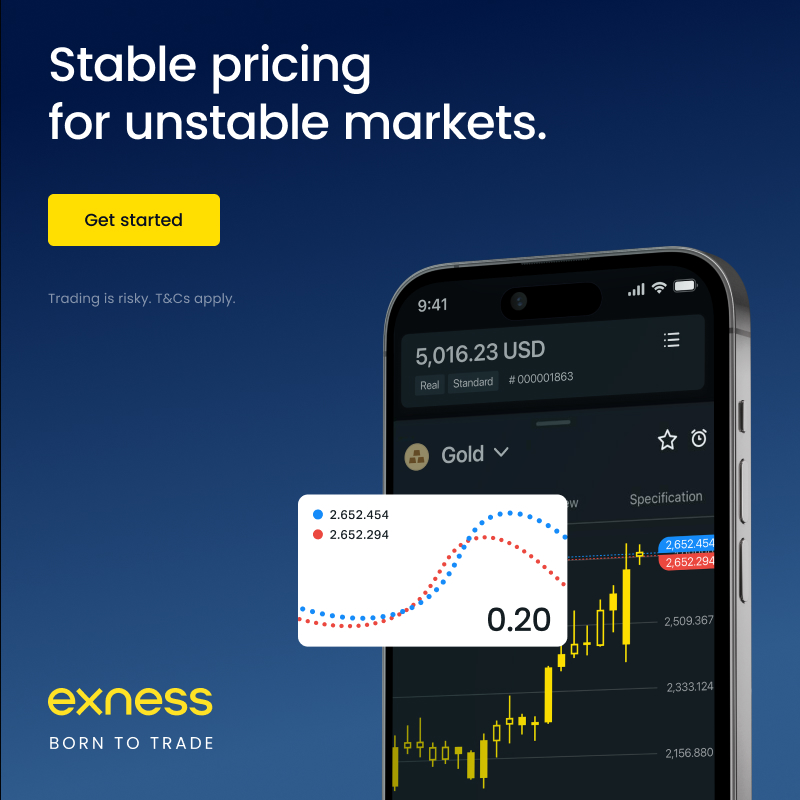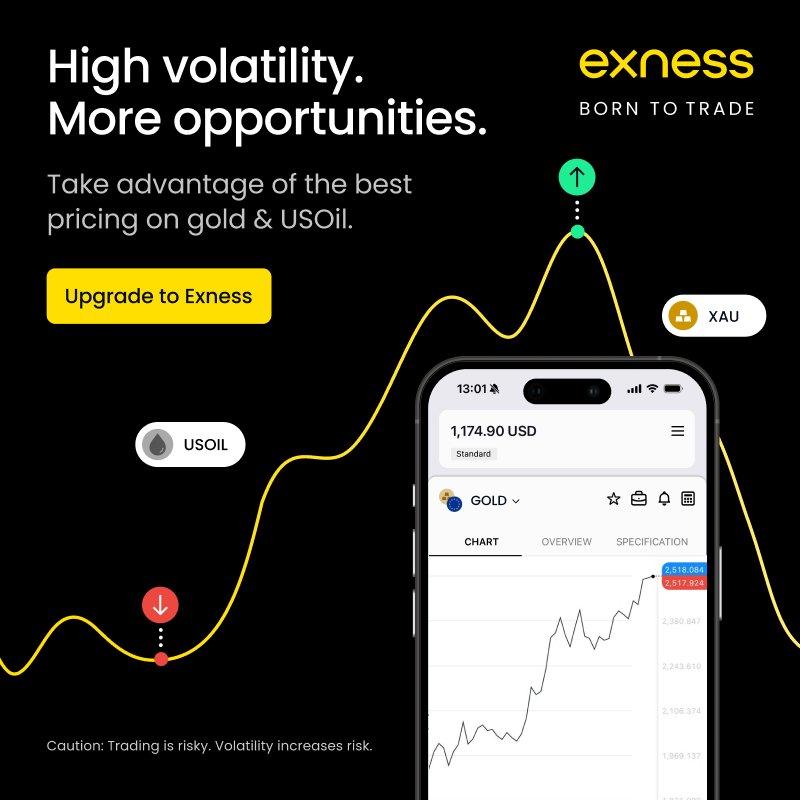
8 minute read
Exness vs XTB: Which Broker Is Better?
from Exness
by Exness Blog
Choosing the right forex broker can make or break your trading journey. Exness vs XTB are two heavyweights in the forex and CFD trading world, each with unique strengths. But which one is better for you? In this article, we’ll dive straight into a head-to-head comparison of Exness and XTB, covering regulation, fees, platforms, trading instruments, and more, to help you decide which broker suits your needs in 2025. Let’s get started!

✅ Trade with Exness now: Open An Account or Visit Brokers 👈
Overview: Exness vs XTB at a Glance
Exness, founded in 2008, is a Cyprus-based broker known for tight spreads, high leverage, and a low entry barrier. XTB, established in 2002 and headquartered in Poland, shines with its user-friendly xStation platform and robust educational resources. Both are regulated by top-tier authorities, ensuring trust, but they cater to slightly different trader profiles. Exness is ideal for those seeking low-cost trading with flexible leverage, while XTB appeals to beginners and those prioritizing education and platform usability.
Now, let’s break it down by key factors to see which broker comes out on top.
1. Regulation and Trustworthiness
Trust is everything when you’re entrusting your money to a broker. Both Exness and XTB score high on regulatory oversight, but there are nuances.
Exness is regulated by multiple authorities, including the Financial Conduct Authority (FCA) in the UK, Cyprus Securities and Exchange Commission (CySEC), and others like the FSA in Seychelles. Its multi-jurisdictional regulation ensures client fund segregation and negative balance protection. However, its European entities don’t accept retail clients, so non-institutional traders sign up under offshore entities, which may carry slightly higher risk.
XTB, publicly listed on the Warsaw Stock Exchange, is regulated by the FCA, CySEC, and Poland’s KNF. This public listing adds an extra layer of transparency, and its European focus ensures strict compliance with MiFID II standards. XTB also segregates client funds and offers negative balance protection.
Verdict: Both brokers are trustworthy, but XTB’s public listing and European focus give it a slight edge for those prioritizing transparency. Exness, however, offers broader regulatory coverage across jurisdictions, which may appeal to global traders.
2. Trading Platforms
Your trading platform is your gateway to the markets, so it needs to be reliable and intuitive.
Exness offers MetaTrader 4 (MT4), MetaTrader 5 (MT5), its proprietary Exness Terminal, and the Exness Trade App. MT4 and MT5 are industry standards, loved for their charting tools and automated trading capabilities. The Exness Terminal is a web-based platform with a minimalist design, ideal for quick trades, while the Trade App supports mobile trading with one-click execution. Exness also offers social trading, allowing beginners to copy experienced traders.
XTB provides MT4 and its proprietary xStation platform. xStation is a standout, offering a user-friendly interface, advanced charting, and real-time market data. It’s particularly praised for its speed and customization, making it a favorite for both beginners and pros. However, XTB lacks MT5, which could be a drawback for traders wanting access to more asset classes.
Verdict: Exness wins for platform variety, offering MT5 and social trading, which XTB lacks. However, XTB’s xStation is a gem for those who value a polished, intuitive experience.
3. Fees and Spreads
Costs can eat into your profits, so let’s compare the fee structures.
Exness is known for competitive spreads, especially on its Raw Spread and Zero accounts, where spreads can start at 0.0 pips for major pairs like EUR/USD, though commissions apply (up to $3.50 per lot per side on Raw Spread accounts). Its Standard account has no commissions but slightly wider spreads (from 0.3 pips). Exness also offers no deposit or withdrawal fees, which is a big plus.
XTB boasts low spreads, starting from 0.9 pips on EUR/USD for its Standard account, with no commissions on most instruments. However, its commission-based accounts (like Pro accounts) may have higher costs than Exness’s Raw Spread accounts. XTB also has no withdrawal or deposit fees, but currency conversion fees may apply for non-USD accounts.
Verdict: Exness takes the lead for lower spreads on commission-based accounts, especially for high-frequency traders. XTB is better for those preferring commission-free trading with competitive spreads.

✅ Trade with Exness now: Open An Account or Visit Brokers 👈
4. Account Types and Minimum Deposits
Flexibility in account types and low entry barriers are crucial, especially for beginners.
Exness offers five account types: Standard, Standard Cent, Pro, Raw Spread, and Zero. The Standard and Standard Cent accounts have no minimum deposit, making them perfect for newbies. The Pro, Raw Spread, and Zero accounts cater to experienced traders with tighter spreads but require higher deposits (starting at $200 in some regions).
XTB provides two main account types: Standard and Pro. The Standard account has no minimum deposit, ideal for beginners, while the Pro account, designed for advanced traders, may require a higher initial deposit depending on the region. XTB’s simplicity in account offerings makes it less overwhelming for new traders.
Verdict: Exness offers more account variety, especially for professionals, while XTB’s straightforward options suit beginners. Both have low or no minimum deposits, making them accessible.
5. Trading Instruments
A diverse range of assets allows you to diversify your portfolio.
Exness supports over 230 instruments, including forex (90+ pairs), cryptocurrencies, indices, commodities, stocks, and metals. Its focus on forex and crypto makes it appealing for traders interested in these markets.
XTB offers over 5,800 instruments, including forex, stocks, ETFs, indices, commodities, and crypto CFDs. Its real stock and ETF trading with 0% commissions is a unique feature, especially for long-term investors.
Verdict: XTB dominates with its vast asset selection, particularly for stock and ETF traders. Exness is better for forex and crypto-focused traders but lacks the breadth of XTB.
6. Customer Support and Educational Resources
Great support and learning tools can elevate your trading experience.
Exness provides 24/7 customer support via live chat, email, and phone, with quick response times noted in user reviews. Its educational resources include webinars, tutorials, and market analysis, though they’re not as extensive as some competitors.
XTB offers 24/5 support, with phone, email, and live chat options. Its support is praised for responsiveness, and its educational offerings are a standout, with a comprehensive help center, webinars, trading guides, and tutorials tailored for beginners and advanced traders.
Verdict: XTB wins for its superior educational resources, ideal for beginners. Exness edges out slightly in support availability with its 24/7 model.
7. Deposit and Withdrawal Methods
Seamless funding and withdrawals are non-negotiable.
Exness supports a wide range of payment methods, including bank transfers, credit/debit cards, e-wallets (Skrill, Neteller), and cryptocurrencies like Bitcoin. Withdrawals are typically processed within 24 hours, with no fees.
XTB offers bank transfers, credit/debit cards, and e-wallets like Skrill and Neteller but has fewer options compared to Exness. Withdrawals are fast (often within 1-2 days) and fee-free, though currency conversion fees may apply.
Verdict: Exness takes the lead with more payment options, including crypto, and faster withdrawals.
8. Mobile Trading Experience
Trading on the go is a must in 2025.
Exness’s Trade App is sleek, offering one-click trading, account management, and real-time data. It’s highly rated for its simplicity and speed.
XTB’s xStation mobile app is equally impressive, with advanced charting, fast execution, and a user-friendly interface. It’s a favorite for mobile traders who need robust tools.
Verdict: It’s a tie. Both apps are top-notch, catering to different preferences—Exness for simplicity, XTB for advanced features.
Who Should Choose Exness?
Exness is ideal for:
Traders seeking ultra-low spreads and high leverage (up to 1:2000 in some regions).
Forex and crypto enthusiasts.
Beginners who want no minimum deposit and flexible account types.
Those who value 24/7 support and diverse payment methods, including crypto.
Who Should Choose XTB?
XTB is perfect for:
Beginners who prioritize education and a user-friendly platform.
Traders interested in stocks, ETFs, and a broader range of instruments.
Those who prefer commission-free trading with competitive spreads.
Investors seeking a publicly listed broker for added transparency.
Final Verdict: Exness or XTB?
Both Exness vs XTB are excellent brokers, but your choice depends on your trading style. Exness is the go-to for low-cost forex and crypto trading, with tight spreads, high leverage, and a variety of platforms. XTB shines for beginners and long-term investors, thanks to its xStation platform, extensive educational resources, and vast asset selection.
If you’re a high-frequency trader or crypto enthusiast, Exness might be your best bet. If you’re new to trading or want to diversify into stocks and ETFs, XTB is the stronger choice. Why not try their demo accounts to test the waters? Sign up with Exness or XTB today and see which platform feels right for you!
✅ Trade with Exness now: Open An Account or Visit Brokers 👈
Read more:










